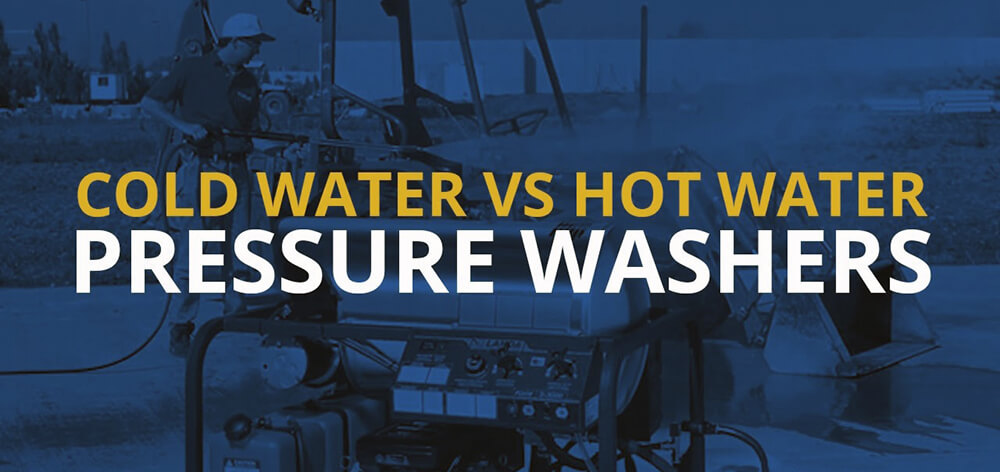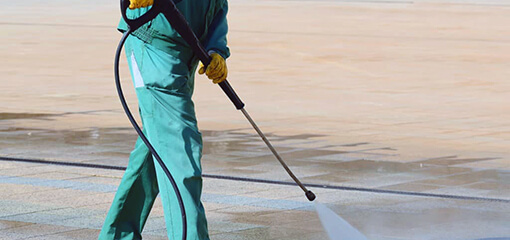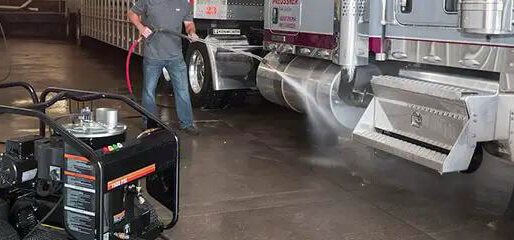14Jan 2023
table of contents
Pressure washers are key tools for home cleaning. They speed up tasks like washing your car or driveway. But did you know there are two main kinds?
Pressure washer suppliers on the market today primarily offer two basic designs: hot water pressure washers or cold water pressure washers. You might think that the difference between the two is simply the difference between using cold water versus hot water, but these machines have more differences in application, cleaning ability and cost.

Cold water pressure washers are ideal for cleaning surface dirt and grime. From concrete driveways to metal vehicles, multiple surfaces can be cleaned with a BISON cold water pressure washer.
Cold pressure washers rely on the pressurized cold water produced by the machine to break down any dirt on the surface, works by using small engine to drive a water pump to pressurize water, directing it through a hose and spray gun, and using the resulting forceful stream to clean various surfaces. Users can also add detergent to the mix to more effectively clean surfaces without the added expense of hot water washing.
Also, cold water is preferred for certain surfaces that may warp at high temperatures, such as wood or plastic. Because of this, cold water is one of the best ways to power decks, siding, and even cars and boats.
The only weakness of the BISON cold water pressure washer is that it doesn't clean grease as effectively as hot water models.
hot water pressure washer works by pressurizing water, heating it to a high temperature, are capable of producing hot water up to 200 degrees Fahrenheit. and using the resulting hot, forceful stream to clean surfaces.The hot water is particularly effective at breaking down greasy or oily substances, as the heat can make these materials less viscous and easier to remove.
Hot water pressure washer has three key elements—heat, agitation, and soap—to successfully remove grease and grime.
The heat creates high-speed molecular action, making the detergent more active and lowering the surface tension of the water, allowing it to effectively penetrate dirt at the molecular level.
Agitation is the effect of the volume and pressure of the water hitting the surface - similar to scrubbing dishes by hand in the kitchen sink.
Soap (often referred to as "detergent" by pressure washer users) chemically breaks the bond between the dirt and the surface. It starts when oil and grease molecules attach to dirt and trap or bind them to the surface. Detergents use emollients to emulsify oils and greases—the process by which two or more immiscible liquids, such as oil and water, no longer repel each other but instead mix. Once the oil and water are able to mix to form an emulsion, the dirt still attached to the oil and grease is carried away by the wash water.
Hot water pressure washers typically have a larger size compared to cold water washers. They are designed this way to accommodate the heating element. This component heats the water before it is expelled. Because of its size, it adds bulk to the washer. However, their larger size often means they are less portable. They may require more storage space and be harder to manoeuvre. But for many, the enhanced cleaning power outweighs these drawbacks. These hot water pressure washers are also often a better choice in colder climates where water pipes may freeze.
For pressure washers, cold water is best for smaller messes. If your business is housing related, such as cleaning services, this is the equipment you want.
But BISON cold water pressure washers are generally not suitable for industrial work. Oil and grease are an ever-present problem in most industries that run heavy machinery. Cold water won't work on oil or grease because the high pressure isn't high enough to break up really stubborn spills. In these cases, pressure washers really only have one option.

That's a hot water pressure washer. Hot water pressure washers are designed for industrial cleaning jobs. Cold water pressure washers are generally not very useful when you need to clean heavy machinery.
Hot water pressure washing is the most effective method of dealing with the grease that coats the surfaces of various vital mechanical parts. Let's take a look at some of the industries that typically benefit from purchasing a hot water pressure washer.
Catering Services
In commercial food service, oil is an essential ingredient in the preparation of a variety of dishes. Whether you're adding oil to a deep fryer or sizzling a pan, oil often spills out of its intended container. Once on the floor, this creates an accident waiting to happen, as a fast-moving cook could slip and injure himself.
Hot water pressure washers quickly degrease kitchen surfaces, allowing staff to move with the speed necessary to continue serving hungry customers. Not only that, but the heat does a great job of killing any bacteria that might spoil stored food.
Put up
Properly lubricated machinery is the cornerstone of a well-run job site, and grease is a natural byproduct of efficient equipment maintenance. You don't want excessive oil or grease coverage, you need to keep the surface clean, reducing productivity.
In these cases, using a cold water pressure washer will not do much to degrease these surfaces and will end up just pushing around to remove whatever grease it is trying to remove. Hot water is the only correct option for spot cleaning.
Freight
Hot water washers take care of road grime, gas leaks and more to keep your truck looking clean and tidy. Not only that, but excess oil and grease can be dangerous when loading and unloading truck chassis. Hot water pressure washers are designed to handle these situations.
Car
For anyone who works in an automotive workshop, grease is just part of the day-to-day operations. Cars need oil to run, and grease is necessary to keep all of the vehicle's components well lubricated and running efficiently. This means that most messes to be tackled require serious cleaning power.
Chemical spills not only create a fall hazard, but also emit toxic fumes that can injure employees. Hot water pressure washer is the best solution for any amount of sticky mess.

Now that we've identified the pros and cons of hot and cold pressure washers, it’s time to really decide which pressure washer is better for your needs. Making the wrong decisions can ultimately cost your sourcing business – both financially and in terms of reduced customer satisfaction.
Before importing pressure washing machine, also consider the following to help you make the right decision.
While not the ultimate question, a relatively easy way to decide between BISON hot and cold pressure washer is to consider the industry it is primarily sold into. Oil and gas, food service and waste management industries that routinely deal with caked grease, oil and dirt may benefit from the enhanced cleaning capabilities of a hot pressure washer. Meanwhile, those who use a pressure washer for transportation, agriculture, and personal use can often use a cold pressure washer to clean dirt.
Another factor to consider is cost. The average cost of a hot water pressure washer is three times that of a cold water system. This comes from the direct cost of the machine and the indirect cost of constantly heating the water throughout the operation, requiring additional mechanical parts and higher fuel costs.
Cold water pressure washers are versatile due to the use of cold water in the system. Some BISON models will even come with nozzles and other features. These nozzle tips mean that the user can adjust the angle of the water flow and pressure according to the job being done, making the pressure washer even more versatile and suitable for personal use.
Hot water pressure washers are not as versatile as cold water models due to their increased cleaning power. Hot water can do more damage if used on plastic or other materials that would melt or crack at high temperatures.
When using a hot water pressure washer, you need to be more careful about what it hits. In addition to pressure wounds, hot water can cause severe burns.
As you can see, there are pros and cons to both hot and cold water pressure washers. Both types of pressure washers have their own advantages and disadvantages. The BISON export service team is happy to assist you, we can help you find out more about your pressure washer models.
inquiry form here
BISON BLOG, All the latest news and views from Bison Machinery.
Related Articles
Cold VS Hot Water Pressure Washer